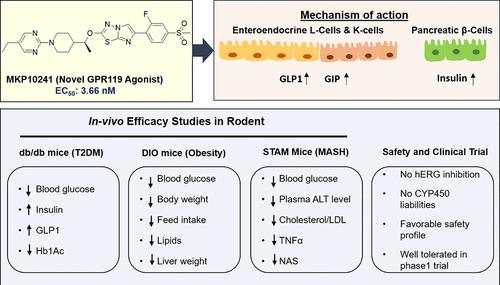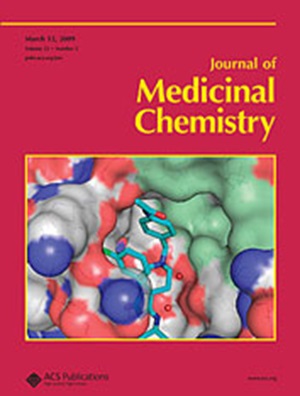靶向GPR119/肠促胰岛素轴治疗代谢紊乱的新型小分子MKP10241的发现
IF 6.8
1区 医学
Q1 CHEMISTRY, MEDICINAL
引用次数: 0
摘要
据报道,GPR119调节在预防或治疗各种代谢紊乱方面具有很好的作用,包括2型糖尿病、胰岛素抵抗、β细胞功能丧失、高脂血症、肥胖、脂肪肝、MASH和肝硬化。我们开发了一种有效的GPR119激动剂MKP10241,它可以提高GPR119表达细胞系中环磷酸腺苷(cAMP)的水平,降低急性模型和慢性糖尿病小鼠模型中的血糖水平和HbA1c。在dio小鼠中,慢性治疗MKP10241显示出在测试剂量下体重和采食量的显著减少,这与血糖水平、脂质参数和体脂肪的降低有关。MKP10241在STAM小鼠MASH/MASLD模型中的进一步评估显示出显著的MASH分辨率。MKP10241在大鼠和狗的临床前毒性和遗传毒性研究中进行了评估,发现是安全的。考虑到临床前安全性和有效性,MKP10241已经在健康志愿者的i期临床试验中进行了安全性、耐受性和药代动力学评估。本文章由计算机程序翻译,如有差异,请以英文原文为准。

Discovery of MKP10241, a Novel Small Molecule Targeting the GPR119/Incretin Axis to Treat Metabolic Disorders
GPR119 modulation is reported to have a promising role for preventing or managing various metabolic disorders, including type 2 diabetes, insulin resistance, loss of beta cell function, hyperlipidemia, obesity, fatty liver, MASH, and cirrhosis. We have developed a potent GPR119 agonist, MKP10241, which has elevated cyclic adenosine monophosphate (cAMP) levels in the GPR119 expressing cell line and reduced blood glucose levels and HbA1c in acute models and a chronic diabetic mouse model. Chronic treatment of MKP10241 in DIO-mice exhibited marked reduction in body weight and feed intake at tested doses, which was associated with decreased blood glucose level, lipid parameters, and body fats. Further evaluation of MKP10241 in the STAM mouse model of MASH/MASLD showed significant MASH resolution. MKP10241 was evaluated in preclinical toxicity and genotoxicity studies in rats and dogs and found safe. Considering the preclinical safety and efficacy profile, MKP10241 has been advanced for safety, tolerability, and pharmacokinetic evaluation in healthy volunteers in a Phase-I clinical trial.
求助全文
通过发布文献求助,成功后即可免费获取论文全文。
去求助
来源期刊

Journal of Medicinal Chemistry
医学-医药化学
CiteScore
4.00
自引率
11.00%
发文量
804
审稿时长
1.9 months
期刊介绍:
The Journal of Medicinal Chemistry is a prestigious biweekly peer-reviewed publication that focuses on the multifaceted field of medicinal chemistry. Since its inception in 1959 as the Journal of Medicinal and Pharmaceutical Chemistry, it has evolved to become a cornerstone in the dissemination of research findings related to the design, synthesis, and development of therapeutic agents.
The Journal of Medicinal Chemistry is recognized for its significant impact in the scientific community, as evidenced by its 2022 impact factor of 7.3. This metric reflects the journal's influence and the importance of its content in shaping the future of drug discovery and development. The journal serves as a vital resource for chemists, pharmacologists, and other researchers interested in the molecular mechanisms of drug action and the optimization of therapeutic compounds.
 求助内容:
求助内容: 应助结果提醒方式:
应助结果提醒方式:


